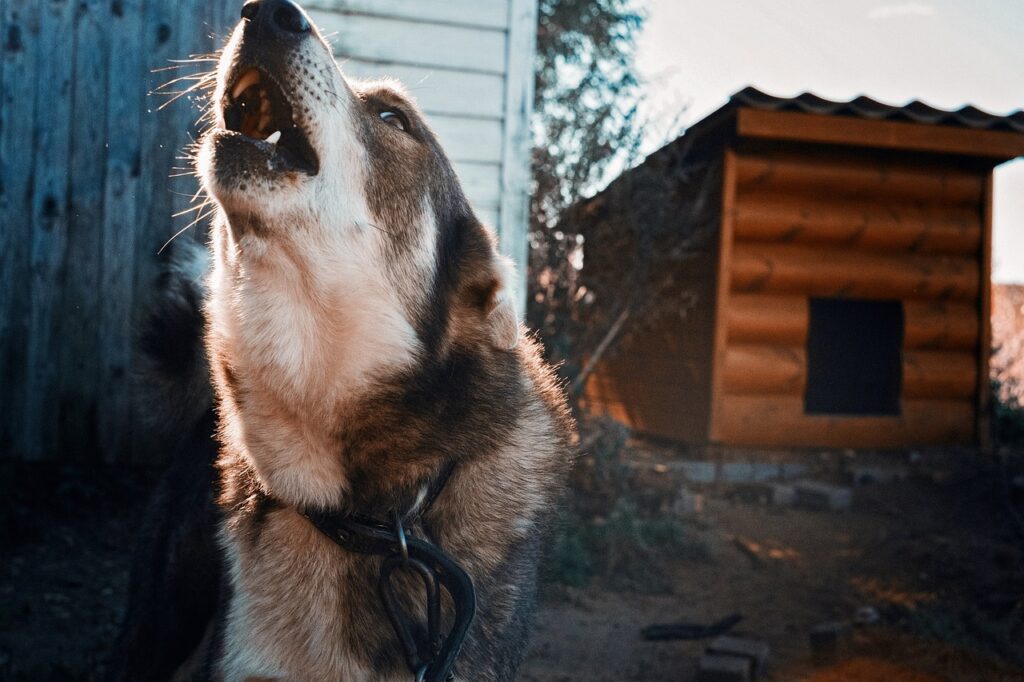Imagine the serene evening ambiance as the sun sets, and suddenly, the distant wail of a siren echoes through the neighborhood. In response, your furry friend lifts their head and unleashes a soulful howl, joining the auditory chorus that reverberates through the streets. This familiar scene raises a timeless question: Why do dogs howl at sirens? In this comprehensive guide, we embark on a journey to delve deeper into this captivating canine behavior, uncovering the intricate interplay of evolutionary instincts, social dynamics, and emotional responses that influence it.
The Origins of Howling
To truly understand why pooches howl at sirens, we must delve into their ancestral roots. Fidos, as descendants of wolves, share a rich heritage of communication through vocalizations. In the wild, wolves howl to maintain contact with pack members, signal their presence over long distances, establish territory boundaries, and coordinate group activities such as hunting. This primal instinct for vocal communication has been deeply passed down in the genetic makeup of domesticated doggos, manifesting itself in various forms, including the howl.
Factors Contributing to Why Dogs Howl at Sirens
Sirens: A Modern-Day Trigger:
While the origins of howling can be traced back to the wild, the modern-day trigger for many puppers’ howling is the sound of sirens. Sirens emit a high-pitched, fluctuating sound that can resemble the calls of other animals, particularly those of potential threats or members of their own species. This resemblance to a potential pack member or rival triggers a response in canines’ primal instincts, compelling them to vocalize in return. Furthermore, the abrupt and intense nature of sirens can be startling to our furry friends, prompting them to react instinctively by howling in response.
Social Influence:
In addition to instinctual triggers, social influences also play a significant role in why doggies howl at sirens. Petted hounds are highly social animals that often mimic the behaviors of their pack or family members. If a pupper hears another bark buddy in the neighborhood howling at a passing siren, they may join in, not merely as an instinctual response but as a way to reinforce social bonds and communicate their presence to other fuzzy pals in the vicinity. This phenomenon is akin to a chorus of voices echoing through the neighborhood, each woof-woof adding their unique voice to the symphony.

Seeking Attention or Connection:
For some tail-wagging chums, howling at sirens may serve as a means of seeking attention or connection with their human companions. Fidos are renowned for their unwavering loyalty and affectionate demeanor with their owners and often seek reassurance and interaction. When a woofer howls at a passing siren and receives a response from their owner, whether it be verbal acknowledgment or physical affection, it reinforces the behavior, leading the loyal critter to repeat it in the future as a way to connect with their beloved human.
An Expression of Anxiety or Discomfort:
On the flip side, for other furry housemates, howling at sirens may stem from feelings of anxiety or discomfort. The loud and unfamiliar sound of a siren can be distressing for pooches, especially those with noise sensitivity or underlying anxiety issues. Howling may serve as a coping mechanism for these doggos, allowing them to release pent-up tension and express their unease in response to the perceived threat.
Coping Mechanisms:
Pups utilize howling as a coping mechanism in various situations beyond just sirens. Separation anxiety, fear of loud noises, boredom, and loneliness are common triggers for howling. When left alone, four-legged pals may howl as a way to alleviate their distress or signal their presence to seek reassurance from their owners. Providing a comfortable and stimulating environment, along with positive reinforcement training, can help address underlying issues and reduce excessive howling behavior.
Breed Variations:
It’s worth noting that certain dog breeds are more prone to howling than others. Breeds such as Huskies, Beagles, and Coonhounds are known for their vocal nature and may be more likely to howl at sirens or other triggers. Understanding breed-specific tendencies can provide insight into why some furballs are more vocal than others and help pawrents manage their behavior accordingly.

Emotional Contagion:
Domesticated hounds may howl at sirens due to emotional contagion, where they mirror and respond to the heightened emotions of their human companions triggered by the sound of the siren. This behavior stems from the tail wagger’s’ empathetic nature and their desire to express solidarity or alleviate perceived distress in those around them.
Tips for Managing Howling Behavior:
While occasional howling at sirens is a natural behavior for many fuzzy fellows, excessive or prolonged howling may indicate underlying issues that require attention. Here are some tips for managing howling behavior in puppers:
- Provide plenty of mental and physical stimulation to keep your treasured beast engaged and satisfied.
- Create a calm and secure environment for your furbaby, especially during times when sirens are likely to be heard.
- Use positive reinforcement techniques to redirect your furry best friend’s attention away from sirens and towards more appropriate behaviors.
- Consider consulting with a professional pooch trainer or behaviorist if your adored critter’s howling becomes problematic or persistent.
The mystery of why doggies howl at sirens continues to intrigue and captivate fur parents worldwide. Whether rooted in instinct, social influence, seeking attention, or expressing anxiety, howling at sirens is a natural behavior for many canine companions. By understanding the reasons behind this behavior and implementing appropriate management techniques, pet guardians can help their canine companions feel more secure and comfortable in their environment, ensuring a harmonious coexistence with the echoes of modern life.












